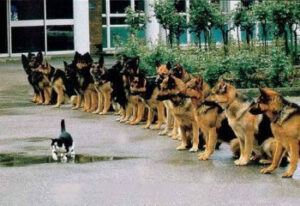Unlike training courses, where the moment of learning and the moment of application can be very distant from each other, this digital device would help with the specific information or idea that is needed at that very moment. All of it seemed like Utopia, especially for us, who had been hands-on non-virtual change managers and leadership developers for several years.
As we got sunk more and more deeply in this idea, we fell in love with the opportunity to create something really great in this digital arena. Although we could not come up with an actionable suggestion for every imaginable people management problem, we were able to offer practical advice for the most common leadership situations. Instead of writing long and theoretical stuff, the mobile format called for easy-to-understand, to-the-point microlearning content. As experienced trainers and coaches, it was clear for us that pure knowledge transfer will be insufficient: if you want behavioural change, we need to help users turn knowledge to action, and nudge them to make commitments that the system can also follow-up. Our IT development partner added gamification elements to make learning more fun. By June, 2015, Act2Manage 1.0 version was developed, and Telekom purchased 600 licences.
We were busy seeking user feedback, and commenced the 2.0 version one year later. Since then, after over a dozen client implementations, we have collected lots of experience about what works well, what the prerequisites of a successful program are, and how to facilitate app usage. We asked for further feedback, listened to the observations and need descriptions of our HR contacts across the globe, and set out to develop the 3.0 version last fall. We have just released the new version and are pleased to show it to HR people in Asia this week at Merit Summit Singapore.
In the back end, we are now capable of serving the diverse organisational needs of our international partners by being able to segment user groups according to our clients’ preferences. On the front end, while users can continue to use the on-demand help and our structured courses, they will experience several new or improved features:
- We built in a Positive Feedback Counter
- Search capabilities have been significantly improved according to user feedback
- All course levels are now open from the first day of use (in the past, the higher levels were locked initially, for gamification purposes, but several users demanded change in this practice)
- You can fill out quizzes more than once from now on – again, something that our users wanted
- We created a message board for user groups to enable social learning among colleagues
- In order to improve reminder functions, a system of optional push notifications has been built into the Android and iOS apps
- The design has become really nice and cool
- We have improved data security features and ensured that the app is GDPR compatible
Why do we call it a milestone?
Over the last couple of years we have had a chance to participate in several discussions around digitalisation, and more specifically, mobile learning related to behavioural change. We can see that there is a lot of interest and talking in the subject, while there is not much action, innovation and implemented corporate projects. There are some tools and initiatives, but the topic is in its infancy world-wide. Companies see it clearly that they need scaleable solutions attracting reasonable costs. Sensible and effective solutions can only be developed if we come up with ideas that get implemented, then modified, then implemented again, then modified again, and so on. We are now at the stage that we have a modern, complex leadership development mobile application, four years of development and client experience gained at multinational companies, usage statistics from over a thousand users, and a clearer picture of what we can expect from a digital tool in leadership development. We are grateful for our corporate partners who were open to implement an innovative approach that neither of us had past experience with. It seems apparent that Act2Manage can enhance the effectiveness of in-person leadership development initiatives, especially by supporting the implementation of newly learned material in everyday practice and helping to remember key learning points later on. In addition, it offers a cost effective, scaleable alternative for situations where personally delivered training sessions and follow-up are not feasible in the target group.
Act2Manage Application
An interactive, gamification-based, practice-oriented leadership development application that provides immediate help and enables follow-up to the most common dilemmas.







